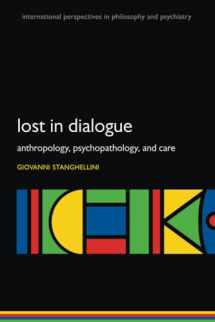
Lost in Dialogue: Anthropology, Psychopathology, and Care (International Perspectives in Philosophy and Psychiatry)
ISBN-13:
9780198792062
ISBN-10:
0198792069
Edition:
1
Author:
Giovanni Stanghellini
Publication date:
2016
Publisher:
Oxford University Press
Format:
Paperback
228 pages
Category:
Psychiatry
,
Psychology
,
Internal Medicine
,
Medicine
FREE US shipping
Book details
ISBN-13:
9780198792062
ISBN-10:
0198792069
Edition:
1
Author:
Giovanni Stanghellini
Publication date:
2016
Publisher:
Oxford University Press
Format:
Paperback
228 pages
Category:
Psychiatry
,
Psychology
,
Internal Medicine
,
Medicine
Summary
Lost in Dialogue: Anthropology, Psychopathology, and Care (International Perspectives in Philosophy and Psychiatry) (ISBN-13: 9780198792062 and ISBN-10: 0198792069), written by authors
Giovanni Stanghellini, was published by Oxford University Press in 2016.
With an overall rating of 3.7 stars, it's a notable title among other
Psychiatry
(Psychology, Internal Medicine, Medicine) books. You can easily purchase or rent Lost in Dialogue: Anthropology, Psychopathology, and Care (International Perspectives in Philosophy and Psychiatry) (Paperback) from BooksRun,
along with many other new and used
Psychiatry
books
and textbooks.
And, if you're looking to sell your copy, our current buyback offer is $0.3.
Description
To be human means to be in dialogue. Dialogue is a unitary concept used by the author to address, in a coherent way, three essential issues for clinical practice: 'What is a human being?', 'What is mental pathology'?, and 'What is care?'. In this book Stanghellini argues that to be human means to be in dialogue with alterity, that mental pathology is the outcome of a crisis of one's dialogue with alterity, and that care is a method wherein dialogues take place whose aim is to re-enact interrupted dialogue with alterity within oneself and with the external world. This essay is an attempt to re-establish such a fragile dialogue of the soul with herself and with others. Such an attempt is based on two pillars: a dialectic, person-centered understanding of mental disorders and values-based practice. The dialectic understanding of mental disorders acknowledges the vulnerability constitutive of human personhood. It assumes that the person is engaged in trying to cope, solve and make sense of new, disturbing, puzzling experiences stemming from her encounter with alterity. Values-based practice assumes that the forms of human life are inherently plural. Value-pluralism and recognition are the basis for care. This statement reflects the ideal of modus vivendi that aims to find terms in which different forms of life can coexist, and learn how to live with irreconcilable value conflicts, rather than striving for consensus or agreement. Care is a method wherein dialogues take place whose aim is to re-enact interrupted dialogue with alterity within oneself and with the external world. It includes practices that belong both to logic - e.g., the method for unfolding the Other's form of life and to rescue its fundamental structure - and empathy - e.g., the readiness to offer oneself as a dialoguing person and the capacity to resonate with the Other's experience and attune/regulate the emotional field.


We would LOVE it if you could help us and other readers by reviewing the book
Book review

Congratulations! We have received your book review.
{user}
{createdAt}
by {truncated_author}


